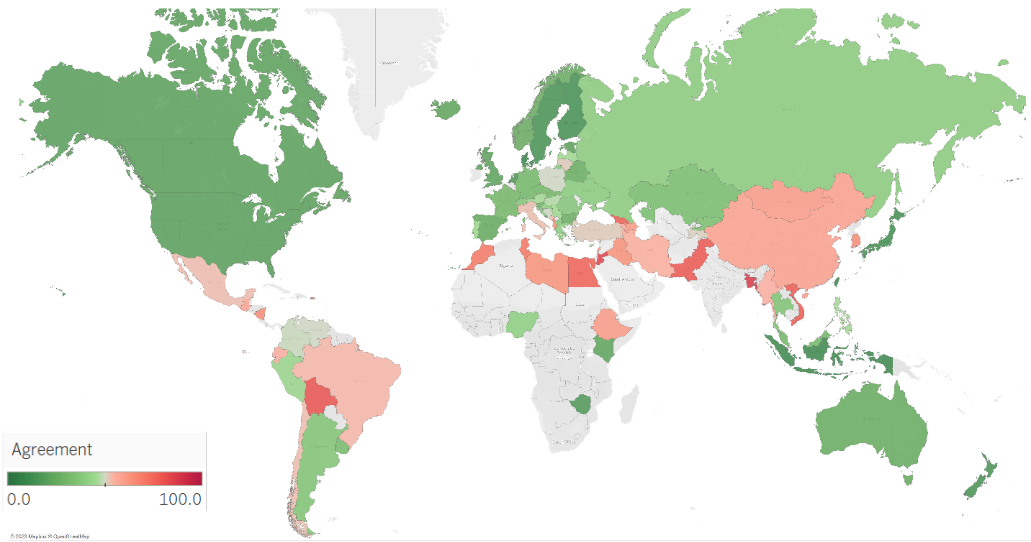Norms are informal rules that influence our daily decisions and play a crucial role in maintaining order. However, attitudes can change over time, leading to a disconnect between people’s existing norms and their desired norms. A recent study by Bursztyn, Gonzales, and Yanagizawa-Drott highlights this disconnect in the case of working wives in Saudi Arabia. The study found that husbands often overestimate society’s opposition to working wives, leading to persistently low labor market participation for women. Providing information about others’ beliefs proves to be a powerful intervention: it helps correct husbands’ believed gender norms and leads to a large increase in their wives’ job applications.
“Providing information about others’ beliefs proves to be a powerful intervention: it helps correct husbands’ believed gender norms”
Norms guide us through many situations in life. When we travel to a new country, we observe different ways of living and try to comply with local semi-formal rules such as tipping policies or how to queue. When we start a new job, we observe how colleagues dress and where they leave their coats, and often mimic and assimilate to those new environments. Similar efforts to assimilate have been observed with gender norms. Gender norms are informal rules and shared beliefs that produce different expected behaviours based on gender identity. Gender norms are widely known to perpetuate gender gaps in the labor market, but they are relevant at the household level too, where they may shape the decision of whether a woman can go to work or how much she should work. While gender norms impact both men and women, a particular focus is usually set on our attitudes towards women. Those attitudes have been measured with surveys where respondents are given statements such as “When a mother works for pay, the children suffer,” and asked for their level of agreement. The map below, for example, shows the average amount of agreement to that statement worldwide, where the color indicates the share of the respondents who agree or strongly agree.[1] The dark red color suggests that there is full agreement with the statement and the dark green color suggests that there is no agreement. The level of agreement varies considerably across countries.

Data source: Haerpfer et al. (2022), illustrated by Manuela Collis
Recent research by Bursztyn, Gonzales, and Yanagizawa-Drott studies the consequences and resolution of gender norms when a woman would like to work, but her husband believes that society won’t accept it, even though he is supportive of her working. These beliefs are referred to as “third-order beliefs,” meaning they are an individual’s perceptions of someone else’s beliefs. If these third-order beliefs are incorrect, it leads to a phenomenon known as “pluralistic ignorance.”
The researchers examine Saudi Arabia as a prime illustration of women’s low labor force participation. The unique aspect of the Saudi Arabian context is the tradition of men’s guardianship, where husbands have the final say on their wives’ employment, clearly demonstrating who holds decision-making power in the household. In 2017, only 15% of Saudi women over the age of 15 were employed, as per official statistics.[2] The proportion of married women in the workforce is even lower, with a national survey conducted by the researchers indicating that only 4% of married women work outside the home.
Through surveys, the researchers uncovered substantial evidence of “pluralistic ignorance” among Saudi Arabian husbands. Specifically, 79% of men aged 18-35 in Saudi Arabia would support their wives working outside the home, yet they mistakenly believe that other men do not hold this view. They estimate that only 63% of men support women working outside the home. This inaccurate third-party perception leads 72% of husbands in the study to underestimate the level of support from other husbands for working wives. As a result, pluralistic ignorance leads to the outcome where fewer women who desire to work are able to do so because their husbands misperceive their peers’ opinions.
The researchers explored the potential for reducing pluralistic ignorance by providing husbands with accurate information on other husbands’ views. They then evaluated the impact on husbands’ decisions to submit their wives’ work applications. The findings showed that providing this information led to an update of beliefs in the long-term and a change in behaviour. Specifically, the intervention led to a 180% increase in job applications from wives, rising from 5.8% to 16.2%. Furthermore, providing information about other husbands’ support for women working outside the home altered husbands’ perceptions beyond that topic, making them more open to other changes, such as allowing their wives to attend driving lessons.
“gender norms can be changed by collecting individuals’ true beliefs and then sharing the group’s average beliefs.”
This study highlights the role of gender norms in affecting women’s participation in the labor market and how incorrect beliefs about these norms contribute to the low number of married women in the workforce. The study suggests that gender norms can be changed by collecting individuals’ true beliefs and then sharing the group’s average beliefs. Updating gender norms is challenging, and this approach may be an untapped resource in promoting gender equality across different contexts. For example, in the workplace, organizations could start experimenting with the way they communicate outcomes from climate surveys, surveys designed to collect data on attitudes at the workplace. However, more research is needed to understand misperceived gender norms, their impact on career outcomes, and whether information on others’ attitudes will translate into behavioral change as they did in the context of Saudi Arabia’s labor market.
References
[1] Haerpfer, C., Inglehart, R., Moreno, A., Welzel, C., Kizilova, K., Diez-Medrano J., M. Lagos, P. Norris, E. Ponarin & B. Puranen (eds.). 2022. World Values Survey: Round Seven – Country-Pooled Datafile Version 5.0. Madrid, Spain & Vienna, Austria: JD Systems Institute & WVSA Secretariat. doi:10.14281/18241.20
[2] Bursztyn, Leonardo, Alessandra L. González, and David Yanagizawa-Drott. 2020. “Misperceived Social Norms: Women Working Outside the Home in Saudi Arabia.” The American Economic Review 110 (10): 2997–3029.
______
Research brief prepared by:
Title
Misperceived Social Norms: Women Working outside the Home in Saudi Arabia
Author
Leonardo Bursztyn, Alessandra L. González, David Yanagizawa-Drott
Source
American Economic Review
Published
2020
DOI
10.1257/aer.20180975
Link
https://doi.org/10.1257/aer.20180975







